The international media have begun to pay more attention to developments in Mozambique on account of the growing operations of an insurgency in the north of the country that declares its allegiance to the Islamic State and comes under the group's 'Central Africa Province' (even though Mozambique is in southern Africa).
In general, we face two problems in analysing this insurgency. The first problem is that Mozambique generally comes well outside the purview of specialists of the Islamic State, who have primarily concerned themselves with the Islamic State in Iraq and Syria and countries in the wider Middle East and North Africa. The second problem- arguably more troubling- is the denial among some Mozambique specialists that the insurgency in northern Mozambique has any connection with the Islamic State.
I do not claim to be a specialist on Mozambique or the insurgency in the country, but I believe we should all play our part where we can to try to contribute to a better understanding of the insurgency and the local developments. This situation calls for cooperation between the jihadism and country specialists, not opposition to each other. A model of how such cooperation has been realised elsewhere is a paper published by the George Washington University Program on Extremism on the Islamic State insurgency in the Democratic Republic of Congo.
In this post, it is my intention to compile an archive of Portuguese-language sources (accompanied with my translation) that could shed more light on the origins of the insurgency and its context in Mozambique. I am particularly interested in this regard in local Mozambican media reports in Portuguese and I begin the archive with an interesting article that appeared in a local outlet (O Pais) on attacks in October 2017 that were attributed at the time to a group called 'al-Shabaab' (NB: not to be confused with the al-Qa'ida affiliate in Somalia). I will hope to add to this archive over time and, if you readers come across any articles of interest that you think I should translate, please send them over. Let us work together on these matters and not oppose each other in enmity. Also if you have any suggestions for amending my translation, let me know.
Specimen A: Report in O Pais, 9 October 2017
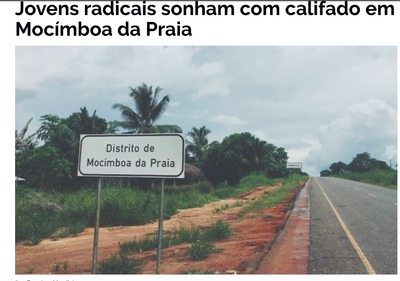
Radical youths dream of a caliphate in Mocimboa da Praia
By Francisco Mandlate, 9 October 08h40

In the early hours of last Thursday, the town of Mocimboa da Praia, in the north of the province of Cabo Delgado, woke up to shots. The target were the squadrons of the police and the control post of the Border Guard Force. The confrontations extended until Friday and shots were fired again in the afternoon of Saturday. The result of the confrontations points to 16 deaths: 14 on the side of the attackers and two agents of the police, and various wounded.
Soon, various questions arose. Who are the attackers? From where do they come? Or what do they demand? The police, which immediately carried out arrests, says that it is investigating in order to be able attain answers to these questions. However, it has ruled out the hypothesis that was locally advanced by the people that the attacks were perpetrated by members of an Islamic religious sect self-named al-Shabaab.
Our team went to Mocimboa da Praia to seek out this information. The truth is that all the residents of that town do not have the slightest doubt that the attacks were perpetrated by the members of the aforementioned sect al-Shabaab. What, then, is that which leads the people to assume that such a sect is responsible for the attacks?
In the neighbourhood of Nanduadue, we found the response to this question. It is in that neighbourhood that the sect al-Shabaab has its main mosque, whose building is still under construction. In the same neighbourhood, there is the second mosque, made of precarious material. Since the attacks began, all the members of the sect disappeared and they never went to the mosques again to make prayers, when almost all spent the majority of the time, everyday, in those places of worship.
Hamina Aboobakar, an elderly woman of 68 years, whose residence practically shares the same land with the mosque, says that some elements of the sect appeared, in the early hours of Thursday, in that place with weapons drawn. As she already found herself outside her residence, the same men ordered her to return inside her home.

Amade Mussa is another resident of the neighbourhood of Nanduadue. He says that, at the time of 5 a.m., when she was with other believers in the mosque to pray, the spiritual leader of the al-Shabaab sect appeared, accompanied by four elements, all of them armed. He told Amade and other believers that they were not the targets of his armed men, but rather the defence and security forces. He clearly said that they would only attack the people if they denounced them to the police authorities.
Amade says that at the time, they questioned the reasons for the attacks, so the leader of the group responded that they want to see the application of the Islamic law, the Shari'a: 'If I have problems with my wife, one must not go to the police squadron, one must have those monhés of matters of married people, and not to go to the command. Having problems of crime is not to go to the command, there has to be application of Islamic law. That is what they want. They demand for the removal of the statues of the presidents Samora Machel and Eduardo Mondlane, which were erected in the town, and that Christian cross that is at the entrance of the town, because they say that here is a zone dominated by Muslims and it cannot have symbols of Christians,' clarified Amade. He was seconded by Ms. Hamina: 'They do not want that flag of the government, nor do they want to speak with the government. They only want to be alone to govern. They do not want police, nor chiefs, nor directors, not ministers, much less kids to go to school. They only want al-Shabaab to live alone, to live thus. If you enter into al-Shabaab, your family cannot speak with you. Even if your parents get sick, and even can die, they prefer that they be left alone in the street and be eaten by dogs,' continued Ms. Hamina, who says to have obtained all that information from the meetings that the group held in the mosque.
Issufo John, a Nigerian citizen who is a businessman in Mocimboa da Praia, says that the group appeared in 2014 and he saw his friends join it. And, from that moment, they distanced themselves from him and started to walk alone with other members of the religious sect. According to Issufo, already in that time, they showed signs of being a violent group.
Amade Mussa says that the group, almost in the totality, is composed of native youth of Mocimboa da Praia, with ages that vary between 20 and 35 years. The leader of the group is a local businessman who was never a military man. 'They are all from here from Mocimboa da Praia, we know. Others come from Mocoche in Macomia, others come from Palma, Nangade and Montepuez. The others are from here, we know. But since day six, they fled. If there are persons who come from Somalia or another country, I do not know. Only that I am surprised: where did these men get weapons? If they come from abroad, from where did they come through? Because, here, we have a government with security. How did they manage to come through with weapons? They are new weapons and with new weapons. How did they manage to bring arms even here in Mocimboa da Praia?'- questions Amade, who assures that they did not attack any civilian in his neighbourhood.

The version of Amade and of other residents of Mocimboa da Praia is confirmed by the president of the municipality of Mocimboa da Praia. He says that the attackers are native youth of Mocimboa da Praia and of other neighbouring districts. 'They are all Mozambicans. There may be some foreigners, but the majority are natives of Mocimboa and friends of neighbouring districts. They are youth who think that, when they do that, they belong to that group, but they have no link,' clarified Fernando Neves.
We ask the mayor, if the group already existed three years ago, why were measures not taken to prevent the situations of violence, to which he responded that the government, on receiving information of the existence of the group that called into question the authority of the state in that place, disavowing the laws and wanting to impose its own rules, it identified in the group some foreigners, who were repatriated, almost all coming from Tanzania. This information is confirmed by Amade Mussa. According to him, the only persons of advanced age in the group were businessmen coming from Tanzania, but they have not been found in that town for some time.
Celmira da Silva says that measures were taken
The governor of Cabo Delgado, Celmira da Silva, says that the government took the adequate measures in the moment in which it knew of the existence of such a group. Now, it is working to clarify all the information and is reviewing the various available sources, including the detainees. But, in this moment, one cannot assert that the group that carried out the attacks belongs to the referred sect al-Shabaab, inspire of the population believing that to be the case.
The government has since yesterday been in Mocimboa da Praia, where she met with the local government, the defence and security forces and traditional and religious leaders, in order to understand what transpired and to prepare the return of life to normality, this Monday. In addition, Celmira da Silva spent the night in that town, in order to monitor closely the reopening of the public institutions, markets and shops, in order to be certain that life has returned to normality in that district.
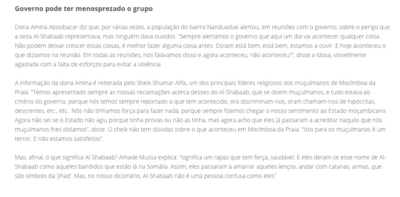
Government may have underestimated the group
Ms. Amina Aboobacar says that, on various occasions, the population of the neighbourhood of Nanduadue warned, in meetings with the government, on the danger that the al-Shabaab sect represented, but no one listened. 'We always alerted the government that here one day something was going to happen. They cannot let these things grow. It is better to do something before. They said it's fine, it's fine, we are listening. And now there has happened what we said in the meeting. In all the meetings, we said that and now it has happened, did it not happen?'- says the elderly woman, visually aghast at the lack of efforts to avoid the violence.
The information of Ms. Amina is reiterated by Sheikh Shumar Alifa, one of the main religious leaders of the Muslims of Mocimboa da Praia. 'We have always been presenting our claims against those of al-Shabaab, who call themselves Muslims, and all was at the government's discretion, because we have always been reporting what has been happening. Sometimes they discriminate against us, sometimes they call us hypocrites, disbelievers etc. etc. We did not have the power to do anything, because we always made our opinion reach the Mozambican state. Now I do not know if the state did not act because it had proofs or did not have them, but now I think that they already started to believe that which we Muslims told them'- he says. The sheikh did not have doubts on what happened in Mocimboa da Praia. 'This for the Muslims is a terror. We are not satisfied.'
But, in the end, what does al-Shabaab signify? Amade Mussa explains: 'It signifies a lad who has force, healthy. And they gave themselves that name of al-Shabaab like those gangs that are over there in Somalia. Thus, they have started to tie those scarves, walk with machetes, weapons, which are the symbol of 'jihad.' But, in our dictionary, al-Shabaab is not a confused people like them.'
Specimen B: Detention of people in Macomia, June 2017
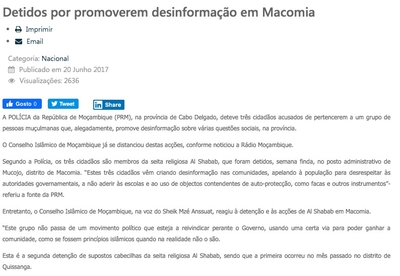
Published on 20 June 2017 [in Noticias]
'Detained for promoting disinformation in Macomia
The police of the Republic of Mozambique (PRM), in the province of Cabo Delgado, arrested three citizens accused of belonging to a group of Muslim persons that allegedly promotes disinformation on various social questions in the province.
The Islamic Council of Mozambique has already distanced itself from these actions, according to a report on Radio Mozambique.
According to the police, the three citizens are members of the religious sect Al Shabab, who were detained, last week, in the administrative post of Mucojo, district of Macomia. 'These three citizens are creating disinformation in the communities, calling on the population to disrespect the governmental authorities, not to go to the schools, and to the use of contentious objects of self-protection, like knives and other instruments'- according to the PRM source.
Meanwhile, the Islamic Council of Mozambique, in the voice of Sheikh Mzé Anssaut, reacted to the detention and the actions of al-Shabaab in Macomia.
'This group is merely a political movement that is making a claim before the government, using a certain way to be able to gain the support of the community, as if they were Islamic principles when in reality they are not as such.'
It is the second detention of supposed leaders of the religious sect Al-Shabaab, as the first occurred in the last month in the district of Quissanga.'
Specimen C: Report from April 2020 by a Mozambican research institute on the first events surrounding 'al-Shabaab'
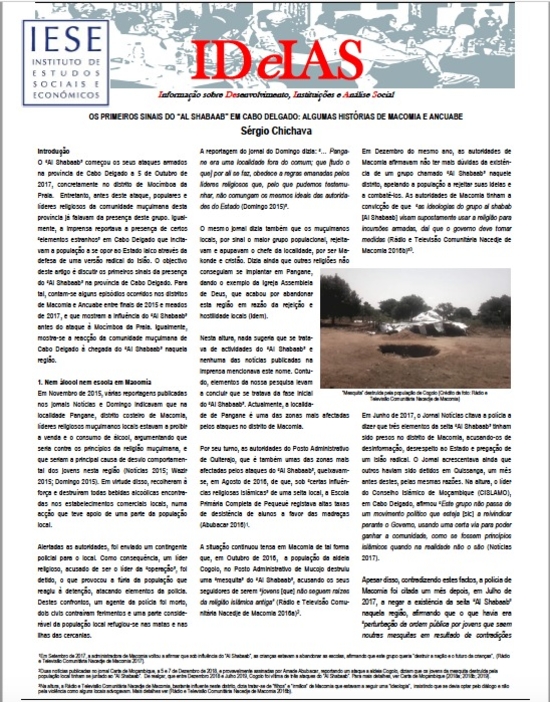
The first signs of 'al-Shabaab' in Cabo Delgado: some stories from Macomia and Ancuabe
Maputo, 24 April 2020.
By Sérgio Chichava
Introduction:
'al-Shabaab' began its armed attacks in the province of Cabo Delgado on 5 October 2017, specifically in the district of Mocimboa da Praia. However, before this attack, religious people and leaders of the Muslim community of this province already spoke of the presence of this group. Equally, the press reported the presence of certain 'strange elements' in Cabo Delgado that were inciting the population to oppose the secular state through defence of a radical version of Islam. The objective of this article is to discuss the first signs of the presence of 'al-Shabaab' in the province of Cabo Delgado. Therefore, some episodes that occurred in the districts of Macomia and Ancuabe between the end of 2015 and the middle of 2017 are recounted, as they show the influence of 'al-Shabaab' before the attack in Mocimboa da Praia. Equally, the reaction of the Muslim community of Cabo Delgado to the arrival of 'al-Shabaab' in that region is discussed.
1. No alcohol or school in Macomia
In November 2015, various reports published in the outlets Noticias and Domingo indicated that in the locality of Pangane, a coastal district of Macomia, local Muslim religious leaders were prohibiting the sale and consumption of alcohol, arguing that it would be against the principles of the Muslim religion, and that they would be the principal cause of delinquency of the youths in this region (Noticias 2015, Wazir 2015, Domingo 2015). In light of this, they forcibly gathered and destroyed all the alcoholic drinks found in the local commercial establishments, in an action that had the support of a part of the local population.
As the authorities were alerted, a police contingent was sent to the locality. As a result, a religious leader, accused of being the leader of the 'operation,' was detained, which provoked the fury of the population that reacted to the detention, attacking elements of the police. Amid these confrontations, an agent of the police was killed, two civilians sustained injuries and a considerable part of the local population fled into the woods and the neighbouring islands.
The report of the outlet Domingo said: '....Pangane was a locality out of the ordinary; which [all that] is done that way, obeys the rules issued by the religious leaders who, according to what we can testify, do not share the same ideals of the authorities of the state'- (Domingo 2015).
The same outlet also said that the local Muslims, incidentally the largest population group, rejected and denounced the chief of the locality for being Makonde and Christian. It also said that other religions did not manage to implant themselves in Pangane, giving the example of the Church Assembly of God, which ended up abandoning this region on account of local rejection and hostility (Ibid.).
Back then, nothing suggested that it had to do with activities of 'al-Shabaab' and none of the news items published in the press mentioned this name. Yet, elements of our research lead to the conclusion that it had to do with the initial phase of 'al-Shabaab.' Currently, the locality of Pangane is one of the zones most affected by the attacks in the district of Macomia.
For their part, the authorities of the Administrative Post of Quiterajo, which is also one of the zones most affected by the attacks of 'al-Shabaab,' complained, in August 2016, that, under 'certain Islamic religious influences' of a local sect, the Escola Primária Completa of Pequeué registered high rates of withdrawal of pupils in favour of the madrasas (Abubacar 2016). [1]
The situation remained tense in Macomia in such a force that, in October 2016, the populace of the village of Cogolo, in the Administrative Post of Mucojo, destroyed a 'mosque' of 'al-Shabaab,' accusing its followers of being 'youths [who] do not follow the roots of the ancient Islamic religion' (Rádio e Televisão Comunitária Nacedje de Macomia 2016a). [2]
In December of the same year, the authorities of Macomia affirmed not having more doubts of a group called 'al-Shabaab' in that district, calling on the poplation to reject its ideas and to fight them. The authorities of Macomia held the conviction that 'the ideologies of the group al-Shabaab supposedly aim to use religion for armed incursions, such that the government must take measures'- (Rádio e Televisão Comunitária Nacedje de Macomia 2016b). [3]
(Photo caption: 'mosque' destroyed by the population of Cogolo (Photo credit: Rádio e Televisão Comunitária Nacedje de Macomia).
In June 2017, the outlet Noticias cited the police as saying that three elements of the sect 'al-Shabaab' had been arrested in the district of Macomia, accusing them of disinformation, disrespect towards the state and preaching of a radical Islam. The outlet added also that others had been detained in Quissanga, one month before this, for the same reasons. At the time, the leader of the Islamic Council of Mozambique (CISLAMO) in Cabo Delgado affirmed: 'This group is merely a political movement that is making a claim before the government, using a certain way to be able to win the community, as if they were Islamic principles when in reality they are not as such'- (Noticias 2017).
Despite this, contradicting these facts, the police of Macomia was cited a month later, in July 2017, denying the existence of the 'al-Shabaab' sect in that region, affirming that what occurred was 'disturbance of the public order by youths who hang out in other mosques as a result of internal contradictions' and that on account of that 'criminal proceedings had been initiated'- (Abubacar 2017).

Yet, Amade Abubacar- one of the first journalists to be arrested by the Mozambican authorities in 2019 on account of the reports that he made on the attacks in Cabo Delgado- reiterated that 'since last year (2016) that there was talk in Macomia of the supposed existence of youths with links to the Islamic group al-Shabaab that is active in Somalia whose mission is to install an Islamic state in east Africa'- (Ibid.).
2. The assault of 'al-Shabaab' on the locality of Intutupué
In July 2016, Saide Bacar, a religious leader affiliated with CISLAMO, issued a circular alerting the Muslims of Cabo Delgado and the official authorities on a situation that was occurring in the district of Ancuabe, caused by elements that he called 'Ali-Xababi.' According to Saide Bacar, individuals who came from the district of Chiúre had entered into a mosque of CISLAMO in Intutupué, between the days of 4 and 5 June 2016, where they began to preach an Islam that offended the Muslims, because it entered into contradiction with the Islam that was practised in Mozambique and in a general sense, their principles did not constitute a part of this religion (Bacar 2016).
Among the principles defended by these individuals, Saide Bacar indicated the following (see table 1).
Table 1: some principles defended by 'al-Shabaab.'
Praying in footwear |
Rejection of secular teaching in favour of Islamic religious teaching |
Obligation of wearing of Islamic veil covering the face, exposing only the eyes |
Restricting the work of women to homemaking |
Prohibition of use and carrying of civil identification documents |
Not hailing the directors of the state |
Not participating in national events |
Rejecting the national flag |
Amputating adulterers and thieves |
Not collaborating with or constituting a part (of) the government and (of the) institutions of the state |
Rejection of the courts of the state in favour of the Islamic courts |
Source: Saide Bacar (2016)
Saide Bacar affirmed that the principles defended by these individuals were 'anti-Islamic, had their origin in Somalia and their objective was to destroy the Islam practised in Mozambique, calling on the competent authorities to take measures in order to prevent its expansion in the country. However, 'al-Shabaab' had managed to attract a part of the believers of the mosque of Intutupué to follow their precepts, which created tumults, leading to the intervention of the police, a situation that ended with the detention and wounding of some of the members of the sect. Yet, in spite of the intervention of the police, the influence of 'al-Shabaab' in Intutupué continued, in such a manner, that, in the only local Escola Primária Completa, the children were leaving en masse, a fact that left the local authorities rather alarmed. The adjunct director of the school said, for example, that 'al-Shabaab' was spreading messages that discourage school attendance, considering that the children should not frequent the public and state schools because these were of the Kafir (infidels or non-Muslims), advising them to frequent only the madrasas. On account of this, the number of children in this school was decreasing. On the other hand, the children who continued to frequent the school were subject to threats. The situation was aggravated through the threat of 'al-Shabaab' to close the school in 2017. The management of the school still tried to hold a dialogue with the members of 'al-Shabaab,' but it was in vain because these people only accepted dialogue if the local school authorities would accede to their ideals and begin to attend their mosques (UJOMU 2016a).
With a view to resolving the situation, the management of the local school sought support from the Muslim leaders of CISLAMO in Pemba. One of the actions taken by CISLAMO was the sending to Intatupué of a team of the Union of Muslim Youth of Cabo Delgado (UJOMU) to hold a dialogue with the local community and show the 'harm' of the actions of 'al-Shabaab.'
The strategy used by UJOMU to counter the propaganda of 'al-Shabaab' was- besides denouncing the actions of this group to the governmental authorities- the carrying out of campaigns of awareness raising against terrorism. In these campaigns, the youth of UJOMU explained who was 'al-Shabaab' by means of projection of films on radical Islamic movements of other countries, like 'al-Shabaab' of Somalia, Daesh et al. These films showed, among other things, youths in military training, attacks on public buildings, civilians, Christians and Muslms who did not agree with the ideas of these groups. In addition to this, UJOMU raised awareness on the importance of the school, showing that, contrary to what was propagated by 'al-Shabaab,' the Muslim religion was not incompatible with the education offered by the state (UJOMU).
These actions of UJOMU show, once again, the pre-sentiment that was in the heart of the local communicate, that 'al-Shabaab' would probably follow the same trajectory of other radical Islamic movements. However, the Muslims affirm that the government delayed to take measures, such that the situation has acquired alarming contours, to the point that 'al-Shabaab' has been attacking militarily the province of Cabo Delgado since October 2017. [4]
Conclusion
In this text there has been the attempt to show the first signs of the presence of 'al-Shabaab' in Cabo Delago. These examples, found in the districts of Macomia and Ancuabe, help to understand that, before transforming itself into a military movement, 'al-Shabaab' was a mere religious sect that rejected the secular state in favour of an Islamic state. Equally, these examples help to see that 'al-Shabaab' encountered some resistance in the heart of the Mozambican Muslim community, particularly from CISLAMO, which has always denounced its actions to the competent authorities and carried out some campaigns of awareness-raising against the propaganda of this group.
[Footnotes]
[1]- In September 2017, the administrator of Macomia reaffirmed that under the influence of 'al-Shabaab,' the children were abandoning the schools, affirming that this group wanted to 'destroy the nation and the future of the children'- (Rádio e Televisão Comunitária Nacedje de Macomia 2017).
[2] Two notices published in the outlet Carta de Moçambique on 5 and 7 December 2018, and probably signed by Amade Abubacar, reported an attack on the village of Cogolo, said that the youths of the mosque destroyed by the local population had joined 'al-Shabaab.' It should be noted that between December 2018 and July 2019, Cogolo was the victim of three attacks of 'al-Shabaab.' For more details, see Carta de Moçambique (2018a; 2018b; 2019).
[3] At the time, Rádio e Televisão Comunitária Nacedje de Macomia, quite influential in this district, said it concerned 'sons' and 'brothers' of Macomia who were following an 'ideology,' insisting that one should opt for dialogue and not for violence as some locals advocated. More details: see Rádio e Televisão Comunitária Nacedje de Macomia (2016b).
[4] See for example, the interview of the president of CISLAMO- Sheikh Aminuddin- with the outlet Savana (Nhampossa 2020).
References
Abubacar, Amade. 2016. Desistência de alunos na EPC de Pequeué preocupa autoridades, CAICC. Disponível em: https://www.caicc.org.mz/diario/?p=6921 (consultado a 12 de Abril de 2020).
Abubacar, Amade. 2017. "No distrito de Macomia não há seita Alsha-bab, afirma comandante da PRM em Macomia". CAICC. Disponível em: https://www.caicc.org.mz/diario/?p=7828 (consultado a 12 de Abril de 2020).
Bacar, Saíde. 2016. Circular no 1/2016 Para cinco distritos da zona sul de Cabo Delgado (Montepuez, Balama, Namuno, Chiure e Ancuabe), Montepuez: CISLAMO.
Carta de Moçambique. 2018a. Raparigas são o novo alvo dos 'insurgentes'. Disponível em: https://cartamz.com/index.php/sociedade/item/305-raparigas-sao-o-novo-alvo-dos-insurgentes (consultado a 21 de Abril de 2020).
Carta de Moçambique. 2018b. Insurgentes atacam em Cogolo. Disponí-vel em: https://cartamz.com/index.php/politica/item/341-insurgentes-atacam-em-cogolo (consultado a 21 de Abril de 2020).
Carta de Moçambique. 2019. Insurgência em Cabo Delgado. Três civis e dois militares morrem em mais um ataque em Macomia. Disponível em: https://cartamz.com/index.php/crime/item/2592-insurgencia-em-cabo-delgado-tres-civis-e-dois-militares-morrem-em-mais-um-ataque-em-macomia (consultado a 21 de Abril de 2020).
Domingo. 2015. Tumultos em Pangane provocam morte e feridos. Disponível em: https://www.jornaldomingo.co.mz/index.php/arquivo/26-reportagem/7791-tumultos-em-pangane-provocam-morte-e-feridos (consultado a 12 de Abril de 2020).
Nhampossa, Argunaldo. 2020. "Sheikh Aminudin e a situação em Cabo Delgado. Governo não ligou aos avisos", Savana, Maputo.
Notícias. 2017. Detidos por desinformação em Macomia. Disponível em: https://www.jornalnoticias.co.mz/index.php/sociedade/68710-detidos-por-promoverem-desinformacao-em-macomia.html (consultado a 22 de Abril de 2020).
Notícias. 2015. Distrito de Macomia: Pangane interdita venda de álcool. Disponível em: https://www.jornalnoticias.co.mz/index.php/sociedade/46036-distrito-de-macomia-pangane-interdita-
venda-de-alcool (consultado a 12 de Abril de 2020).
Rádio e Televisão Comunitária Nacedje de Macomia. 2016a. Populares da aldeia Cogolo em Mucojo, destruíram há dias uma mesquita local, supostamente os seguidores na sua maioria jovens não seguem raízes da religião islâmica antiga. Disponível em : https://web.facebook.com/radionacedjemacomia (consultado a 19 de Abril de 2020).
Rádio e Televisão Comunitária Nacedje de Macomia. 2016b. Grupo Al Shabab deve ser rejeitado pela sociedade. Apelam diversas individuali-dades. Disponível em: https://web.facebook.com/radionacedjemacomia (consultado a 19 de Abril de 2020).
Rádio e Televisão Comunitária Nacedje de Macomia. 2017. Administra-dora de Macomia, apela desacato a mensagens contra acesso a educação. Disponível em: https://web.facebook.com/radionacedjemacomia (consultado a 19 de Abril de 2020).
UJOMU. 2016a. Acta do encontro com a direcção da escola primaria completa de Intutupué, Pemba.
UJOMU. 2016b. Acta da palestra de Intutupué, Pemba.
Wazir, Jonas. 2015. "Cabo Delgado. Interdita pela população. Pangane volta a vender bebidas alcoólicas", Notícias. Disponível em: https://www.jornalnoticias.co.mz/index.php/sociedade/18-provincia-em-foco/47741-cabo-delgado-interdita-pela-populacao-pangane-volta-a-vender-bebidas-alcoolicas (consultado a 12 de Abril de 2020).
Specimen D: Report by 'Pinnacle News' (8 October 2017)

Synthesis of the crossroads of al-Shabaab.
How does the network of al-Shabaab of Cabo Delgado work?
In a previous explanation of Pinnacle News, we clarified how it functions and it is summarised that the Islamic sect, which part of the Muslim believers profess, does not concord with the idols and symbols of the state. For example: the national flag, swastika crosses, the national heroes and also others pertaining to other religious sects. Thus, these instructions are given to all including to the descendants of them. As a result, these lessons [i.e. teachings on the national flag etc.] are easy to be repelled, as long as there is no going to the schools or resolution of any type of conflicts through ways in which the Mozambican government believes.
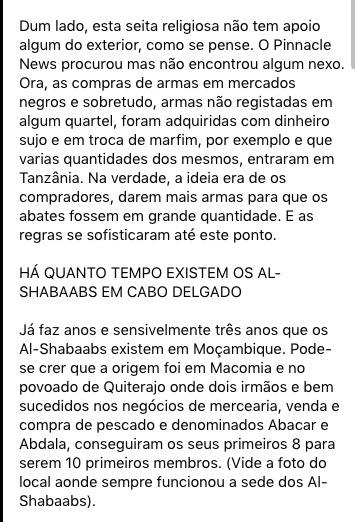
On one hand, this religious sect does not have any external support, as is thought. Pinnacle News looked for but did not find any nexus. However, the purchases of arms in black markets and above all, arms not registered in any barracks, have been acquired with dirty money and in ivory trade, for example, and [it has become clear] that various quantities of the same things have entered Tanzania. In truth, the idea was for the buyers to give more arms so that the slaughters would be in great quantity. And the rules were refined up to this point.
For how long has al-Shabaab existed in Cabo Delgado?
Already for years and roughly for three years al-Shabaab has existed in Mozambique. It can be believed that the origin was in Macomia and in the village of Quiterajo where two brothers- who were also successful in merchant businesses, selling and buying of fish and called Abacar and Abdala- acquired their first eight followers to be the first ten members (see the photo of the locality where the seat of al-Shabaab has always functioned).

As can be seen, in a peaceful district, far-removed from SISE [Mozambique's intelligence agency] as well as any suspicion of being noted.
In truth, the aforementioned house belonged to the first wife of Bacar, who has now been captured in the rescue incursions of some members of al-Shabaab yesterday (9 October) by the police. The same man used shortcuts where ANADARKO [a petroleum company] is intending to make a paved road from Palma to Pemba City. The police had information on his absence and ambushed him, ensuring this man and other members were neutralised in a dense wood (as present photos in the posts of yesterday as well).
How and from where are suspected to have entered the new arms that they used for the first attack?
Tanzania is evident. Via Tanzania and indeed the true instructors. And these brothers went two or three times a year, using permits, to enter and exit Tanzania. The arms were gathered in sacks of cereals and without passengers. The result was that no police took the time to search them, whenever they passed through. This was confided to us by a family member of the divorced spouse of Bacar, now arrested in Mocimboa.

Two open-box vehicles of Canter brand were used for many of the actions that took place in the Mocimboa collision. One of them is in the hands of the police of the same district and the other is adrift with one of the brothers, member and believer in the cause in question.
Where did they train to improve?
The forest of Macomia is vast and at first, they were considered to be furtive Islamic hunters. The weapons were seen by the local population and from the fruit of the hunts, they managed to do much more. There are such great wild and gigantic animals that were slaughtered in Macomia, by these 'Muslims' in training exercises. Parts of the peoples of Mucojo, Quiterajo and Pangane did not have the idea that they were military training exercises.

How and why Mocimboa da Praia?
Inside various possible responses, one can say that 95% of the citizens of Mocimboa da Praia are Muslims. Data of the new general census of the population can confirm it. In addition, they speak the same language and it was intended that through the Kimwani, Maconde, Macua or Kiswahili language, the message on the implantation of the religious sect that preserves the principles of al-Shabaab should be easy and in a short time. There was an attempt through democratic means and that they should convince each one of the Muslims and memorisers of the Qur'an, but it was already time to exert pressure by armed means.
Where was the centre of the conflicts in Mocimboa da Praia?
It was in the most populated and historic neighbourhood of the municipality. It concerns the neighbourhood of Nandwadwa where there are the barracks, the iconic mosque constructed by them and in a terminal phase, the spaces reserved for the barracks for classrooms to function, the great market of Mocimboa, great part of the infrastructure of the state, principally.

What has been the current situation since the first day of the attacks?
The police has managed to spread itself out and is in control of the situation. In the spaces where they gathered and received provisions, specifically in Mocimboa and Macomia, they [these spaces] are momentarily closed and depopulated.
Today for example (8 October), a police contingent that was in two cars, carried out a patrol in the rice paddy of Messalo and Macomia because they had information that part of the insurgents coming from Mocimboa were entering into Macomia. By the way, from Mucojo to Mocimboa da Praia, a coastal route, there are four miles, or in other words, less than 6 kilometres. And it was through the same way that the rifles came into that district and on the sly.

How do you judge the captured to make gains?
If there are conditions, Pinnacle News proposes a religious pre-judgement. That is to say, with a judge who communicates fluently in Arabic language, uses belief in the Day of Judgement, takes sufficient time to work the minds, and make them believe that there are hopes. If there is no qualifies judge such as the one Pinnacle News proposes, there must be elected, molded judges.
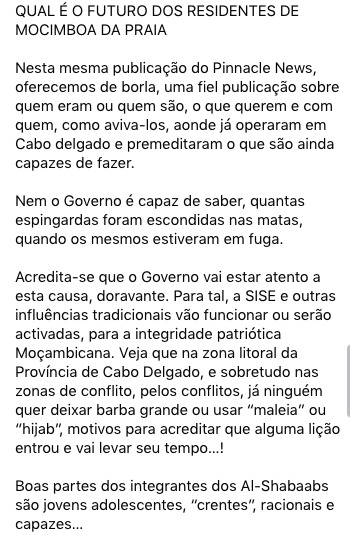
What is the future of the residents of Mocimboa da Praia?
In this same publication of Pinnacle News, we offer for free a reliable publication on who they were were or who they are, what they want and with whom, how they are enlivened, where they already operated in Cabo Delgado and premeditated what they are now capable of doing.
Nor is the government capable of knowing how many rifles were hidden in the forests, when the same people were in flight.
It is believed that the government is going to be attentive to this issue moving forward. As such, SISE and other traditional influences are going to function or will be activated, for Mozambican patriotic integrity. Observe that in the coastal zone of the province of Cabo Delgado, and above all in the zones of conflict, because of the conflicts, now nobody wants to leave the beard to grow long or use 'veil' or 'hijab,' reasons to believe that some lesson has entered and is going to take its time!
Considerable parts of the members of al-Shabaab are adolescent youth, 'believers', rational and capable...

